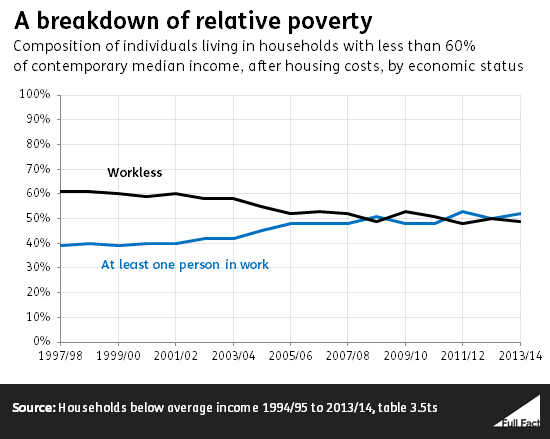Are people in poverty increasingly in work?
"... Increasingly, people in poverty are also in work. Under this Government, work alone no longer pays enough to allow people the dignity of being able to feed their family"—Toby Perkins MP, 25 June 2015
People in poverty have been increasingly in working households, although the trend has flattened in recent years if housing costs are taken into account. Work remains one of the main reasons people move out of poverty.
Although there's no single, preferred measure of poverty in the UK, several show people in poverty split roughly half and half between households where at least one person works, and workless households.
Most of the available analysis focuses on the relative poverty measure, which has recently been rejected by the government as a measure of child poverty.
Half of people with relative low income from a working family
13.2 million people were estimated to be in relative poverty in 2013/14, after housing costs are accounted for. That roughly means anyone in a household earning less than £232 per week (60% of the median income, £386 per week).
Of those, about 52% were in a family where someone was in work, though that falls to 39% just including households with someone working full-time. That compares with 71% of the entire population in a working household, compared to 29% in a workless one.
This was part of a rising trend from the late 1990s to the late noughties, however since then there's been little change in the proportion. Ten years ago only around 43% of people in poverty were in a working family. Now just over half are.
Before 2002, the figures only cover Great Britain.
That might suggest that factors other than work are becoming more important to determining whether someone is in poverty, but at the same time the vast majority of people in work don't fall into this definition of poverty.
One in 12 people in work have relative low income
In the UK 8% of people in employment were also in relative poverty in 2013—the equivalent of around three million people—according to recent analysis by the Office for National Statistics (ONS).
The same analysis went further, looking at the factors behind why people leave poverty, on the same definition. It summarised some of the available research in this field:
"Participation in the labour market has a direct impact on household income and is therefore recognised as perhaps the most effective individual driver of movement in and out of poverty."
For those out of work, about 7 in 10 people stopped being in poverty after they found work between 2007 and 2012, falling to about 6 in 10 if the work was only part-time.
For those in work already, the most likely reasons for moving out were increased earnings or increased hours worked.
Almost two thirds of children in relative poverty are in working families
"2 in 3 poor children are nowadays in families where someone is in work"—Alan Milburn, Chair, Social Mobility and Child Poverty Commission, 1 July 2015
This is right according to the latest figures from 2013/14, where we're using the relative measure of poverty and accounting for housing costs.![]()
For most children living in a relative low-income household, their family contains at least one adult in work. 62% were in a working household and 38% were in a workless one.
Children are still more likely to be in relative poverty if they're in a workless family. 64% of children in workless families live in relative poverty, compared to 21% of children living with at least one adult in work.
Correction (21 October 2015)
We originally stated the figures as showing the economic status of the household. This should have said economic status of the family.
If you're not sure what the difference is, the DWP explains at the bottom of its statistical release:
"A family, or benefit unit, is a single adult or a married or cohabiting couple, together with any dependent children. An adult living in the same household as his or her parents, for example, is a separate benefit unit from the parents.
"A household is defined as one person living alone or a group of people (not necessarily related) living at the same address who share cooking facilities and share a living room or sitting room or dining area. A household will consist of one or more benefit units."
